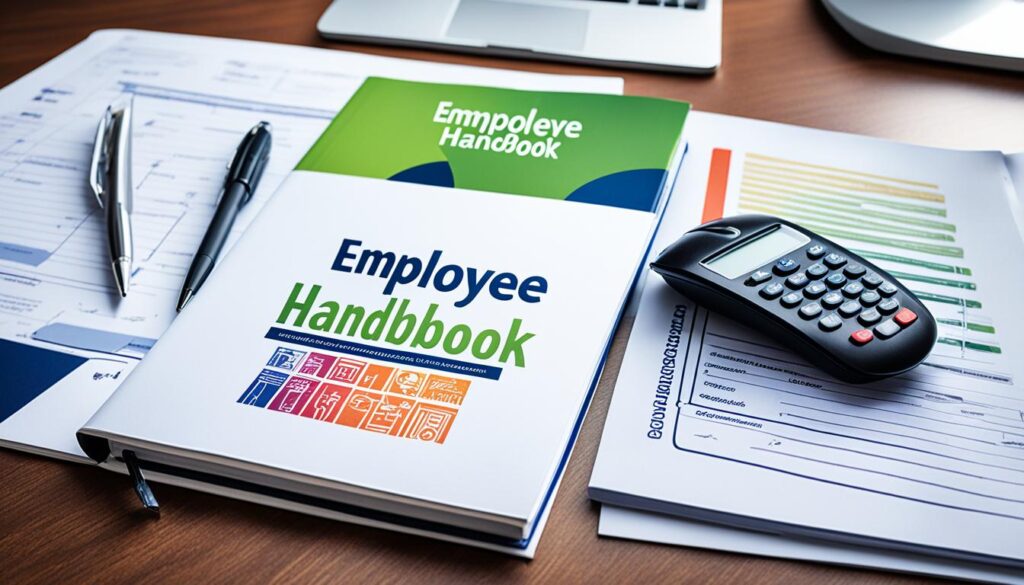
Understanding law basics is key for managing legal issues in your business. This is important whether you’re just starting or already established. I’ll give you an overview of common legal issues and how to tackle them.
Business owners should know about contracts and intellectual property. Learning about the law helps make smart choices that lower legal risks. This supports your business’s success in the long run.
This article will give you practical tips and insights for legal matters as a business owner. You’ll learn about drafting contracts, employee handbooks, and protecting your ideas. Our guide will give you the needed info to deal with the law well.
Key Takeaways:
- Understanding legal basics can help business owners navigate potential legal issues.
- Important areas to focus on include drafting contracts and employee handbooks.
- Protecting intellectual property through trademarks, copyrights, and patents is crucial.
- Knowing the difference between licensing and assigning intellectual property rights is vital.
- Seeking legal assistance when needed can help ensure compliance and mitigate legal risks.
Drafting Business Contracts: Key Considerations
Making sure business contracts are well written is key. Both parties need to clearly know what they must do. Paying attention to every detail helps prevent fights and legal trouble later on. I’ll share what every contract must have, why practical solutions matter, and how to keep terms clear.
Key Elements of a Valid Business Contract
A good contract spells out what each party must do. It says what the contract is meant for, the rights and duties of everyone, payment details, and when things must be done. Also, it’s smart to have ways to solve arguments, keep things secret, and not compete with each other later on. These extra parts depend on what the contract is for.
Including Practical Remedies
No one wants fights, but they can still happen in business. To protect yourself, put real solutions in your contract. This could mean money if things go wrong, ending the contract, or making sure the other party does what they promised. These steps make you feel safer if there’s a problem.
Avoiding Ambiguous Terms
Using clear language is a must to avoid confusion and fights. Use straightforward words to explain important things. It’s smart to define any terms that might not be clear right off the bat. Getting advice from a legal expert is a good idea to make sure there’s no room for guessing in your contract.
Drafting business contracts requires meticulous attention to detail and clear communication. Failing to properly outline the terms and conditions may lead to misunderstandings and potential legal issues. By including the key elements of a valid contract, incorporating practical remedies, and avoiding ambiguous terms, businesses can establish strong contractual foundations and mitigate potential risks.
| Key Considerations for Drafting Business Contracts | Benefits |
|---|---|
| Include all essential terms and conditions | Ensures clarity and understanding |
| Incorporate practical remedies | Provides recourse in case of breaches |
| Avoid ambiguous terms | Prevents misunderstandings and disputes |
Customize each contract to fit the needs of those involved. Getting advice from professionals familiar with writing contracts is a wise move. They can help make sure your contracts are complete, enforceable, and safeguard your interests.
Employee Handbooks: Compliance and Updates
Employee handbooks help businesses by setting clear expectations and sharing policies. They guide employees too. It’s key to make sure these handbooks follow state laws and stay up to date with legal changes. This keeps everyone on the same page while protecting both workers and their bosses.
Addressing State-Specific Laws:
It’s vital to look at each state’s unique employment laws when you make an employee handbook. States differ in what they require for workers’ rights, benefits, and workplace rules. Adding language from each state’s laws means your handbook stays legal. Doing this shows you care about keeping things right for your team under the law.
Update Regularly to Reflect Changes in Law:
New laws and updates happen all the time. A good employer stays on top of these changes and updates the handbook when needed. This keeps the business safe from legal trouble. Updates also make sure everyone knows their current rights and duties.
Inclusion of At-Will Employment Status:
Explaining at-will employment in the handbook is very important. It says that the boss or the worker can end the job at any time, with or without reason. Making this clear in the handbook helps stop confusion. It also makes the work environment straightforward for everyone.
The table below highlights what’s important in employee handbooks and why:
| Considerations | Benefits |
|---|---|
| Incorporating state-specific laws | Ensures compliance and demonstrates commitment to employee well-being |
| Regular updates to reflect changes in the law | Maintains compliance and mitigates legal risks |
| Inclusion of at-will employment status | Establishes transparency and minimizes misunderstandings |
Making and updating handbooks to follow laws is good for both businesses and workers. Next, we’ll look into why protecting your business’s ideas is important.
Protecting Intellectual Property: Trademarks, Copyrights, and Patents
Intellectual property rights are vital for any business wanting to protect its original ideas and work. I’ll explore trademarks, copyrights, and patents in this section. Each serves a unique function in protecting brands, creative works, and inventions. Knowing about these can help you guard your creations and prevent misuse.
Trademarks: A trademark is key to showing off your brand and setting it apart from others. It could be a name, logo, symbol, or special packaging. Registering a trademark gives you the only right to use it for your business. This ensures others can’t copy it, helping customers know and trust your brand.
Copyrights: Copyrights keep your creative works, like books, songs, and artwork, safe from being copied. Having a copyright means you can control how your work is shared or displayed. It’s wise to register your copyright for more legal power, if someone copies your work, you can take them to court.
If you’re a creator, copyrights are a critical way to protect what you make. They keep others from using your work without permission.
Patents: Patents are for new inventions, giving you the sole right to make, use, or sell your creation. They protect your investment in creating something new. Having a patent for your invention means no one else can profit from it without your okay. But remember, getting a patent can be complex. Your invention must be new, useful, and not obvious to others.
“Intellectual property rights allow businesses to protect their unique ideas, brands, and innovations, ensuring they remain ahead in the market. By knowing about these rights, businesses can smartly protect their valuable assets.” – Legal expert
Protecting your intellectual property through trademarks, copyrights, and patents is vital. It discourages others from stealing your work and safeguards your creations. By legally securing your intellectual property, you can fight against misuse and keep your brand’s or work’s integrity. Your intellectual property is key to your business’s success and longevity.
Next, we will discuss the differences between licensing and assigning intellectual property rights.
Licensing and Assigning Intellectual Property Rights
It’s key to know the difference between licensing and assigning IP rights. Licensing allows use under certain conditions but keeps ownership. Assigning, on the other hand, transfers the ownership to another.
Licensing means others can use your IP under set rules. This happens with a licensing agreement. It states the rights granted, any restrictions, and any fees. Both the owner and the user can benefit from this deal.
Assigning IP gives someone else all the rights. This includes all legal responsibilities. An assignment agreement legally transfers the IP rights to the new owner.
The choice between licensing and assigning depends on various factors. This includes the owner’s goals and the IP’s nature. Licensing offers flexibility while assigning means giving up future rights.
For example, software developers often license their software while keeping ownership. On the flip side, inventors might assign their patents to companies for commercial purposes.
You need legal agreements for either choice to safeguard your rights. These agreements should detail the rights granted or transferred, and any fees or terms clearly.
Knowing the difference helps in managing and protecting your intellectual property. Always talk to an IP attorney to protect your rights. Make sure your agreements match your plans accurately.
| Licensing | Assigning |
|---|---|
| Retains ownership | Transfers ownership |
| Allows others to use IP | New owner assumes all rights |
| License agreement | Assignment agreement |
| Flexible terms and conditions | Complete transfer of ownership |
| Potential for royalties or fees | Relinquishes future rights |
Conclusion
As business owners, knowing basic law is key. It helps us dodge legal troubles. By knowing how to write contracts and make handbooks, we keep our businesses safe.
We use clear contracts to set rules and solve problems. This keeps our interests secure. Handbooks cover laws and keep our workplaces fair and legal.
It’s also crucial to protect our ideas and brands. Things like trademarks help us stand out. Copyrights protect our creative work. And patents stop others from copying our new ideas.
In short, keeping up with laws and getting help when needed is smart. It helps us follow the law and protect our businesses. This way, we can stay successful and steer clear of legal problems.
FAQ
What are the essential legal issues that business owners should be aware of?
Business owners need a basic legal understanding for their company. They should focus on contracts, agreements with employees, and laws about owning ideas. By handling these well, they can prevent many legal problems.
What are the key elements of a valid business contract?
A good business contract must have clear terms. It should cover what both parties are giving and getting. Also, it’s vital it’s fair and legal for everyone involved.
How do I create an effective employee handbook?
An employee handbook is key for guiding your team. Make sure it follows the law in your state and is always up to date. Clearly explain the employment status of your workers, too.
What types of intellectual property should businesses protect?
It’s critical for companies to safeguard their unique aspects. This includes their brand (trademarks), creative works (copyrights), and inventions (patents). Doing so helps avoid copycats and keeps their spot in the market safe.
What is the difference between licensing and assigning intellectual property rights?
When it comes to sharing or giving up intellectual property rights, there are two main options. Licensing means someone else can use it, but you still own it. Assigning, however, means you transfer the rights to someone else. For copyrights, getting the ownership details right in the agreement is especially important.
Source Links
- https://squareup.com/us/en/the-bottom-line/operating-your-business/business-laws
- https://www.forbes.com/sites/ellevate/2021/05/11/top-five-legal-basics-for-business-owners/
- https://www.sierracrestlaw.com/employment-law-basics-essential-regulations-every-business-owner-should-know/










